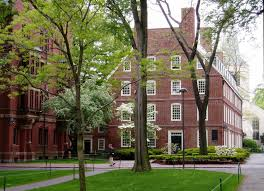6 Countries You Can Study at Top Universities with Affordable Fees and Minimal Immigration Hassles

Uchechi Moses
Uchechi is a Business Development Associate at JarusHub
Within the past years, there has been a throng of Nigerians travelling outside to obtain tertiary education. Either first degrees or post-graduate qualifications, with the latter taking the highest number. So why do most Nigerians desire to study abroad? Some say it is due to the deplorable state of our educational system. To others, a change of environment and pursuit of a global career necessitate it. Yet for another group of people, it is to further their educational pursuit in an environment that has the best of facilities and conduciveness. Popular countries include the UK (A 2015 report showed Nigeria was the 6th highest contributor of foreign students studying in the UK), US (popular for graduates taking standardised tests such as the GRE and GMAT), Canada (similar to the US) and Germany (the free tuition). Others include Australia, Belgium, The Netherlands, Malaysia, Russia and mostly Eastern European countries.
However, and unfortunately, majority of Nigerians who go to obtain foreign education do not get it from top institutions globally. Yes, there are Nigerians studying for undergraduate and post-graduate degrees at Oxford, Harvard, MIT, Imperial College London, Caltech, McGill University, Technical University of Munich etc. However, they constitute a minuscule percentage of the total population of Nigerian students overseas.
This is not to say that Nigerian students are not intelligent or smart to get admitted into top institutions globally. Stringent immigration rules, limited information on what it takes it to be admitted, high fees and let’s admit it, the neck-break competition to get into these institutions can be attributed to the less number of Nigerians compared to say, the Chinese. However, there are countries where you can obtain education from top 1000 institutions at affordable rates, and they come with less immigration hassles compared to the most patronised nations presently by Nigerian students. JarusHub chronicles countries where Nigerians can obtain education from top institutions at affordable prices and less immigration hassles, with opportunities for employment after school.
For the purpose of this article, fees will be in naira.
- ISRAEL: The nation with the second notable hub for technology globally – Silicon Wadi – after the famous Silicon Valley, California. She is especially known for innovation in the high-tech sector. Home to more high-tech start-ups than any country other than the US – pretty outstanding, considering its relatively small size and population. Additionally, in recent years, Israel has also been touted as the world’s next major biotech hub. There are nineuniversities in Israel, as well as lots of higher education colleges; the difference amongst them is that the universities offer degrees all the way up to doctorate level. Courses are often taught in Hebrew, but many leading Israeli universities also offer English-taught programs. 6 out of the 9 Israeli universities made the QS World University Rankings® 2018. With The Hebrew University of Jerusalem, Technion-Israel Institute of Technology (seen as Israel’s MIT), Ben-Gurion University of Negev and Tel-Aviv University making the top 400. Fees for international students range from N3 – 6 million annually for both undergraduate and post-graduate programs. This depends on the school and course. With Jerusalem, Tel-Aviv and Haifa topping the expensive cities (not unexpected as they are the economic nerves’ centres of Israel).
- HONG KONG: Special administrative region of China, where “East meets West”. The fourth global financial centre according to the Z/Yen survey, Hong Kong has some of the best tertiary institutions in the world. From the University of Hong Kong to the Hong Kong University of Science and Technology to the Chinese University of Hong Kong, City University of Hong Kong and The Hong Kong Polytechnic University, all in the top 100 institutions globally. Universities in HK offer courses in English and Chinese Cantonese. Tuition fees are circa N2 million annually regardless of disciplines at post-graduate level, and N5 – 7 million at undergraduate level. Although, Hong Kong is one of the world’s expensive cities especially in housing, it offers quality education in the world’s vibrant economic continent.
3. SOUTH KOREA: An “Asian Tiger”, separated from her belligerent neighbour – North Korea in 1948. 70 years later, Korea (as she’s colloquially called) is amongst the top countries for foreign education, with Seoul – its capital – in the world’s top ten students’ cities. Education in Korea, which has received massive investment over the years is highly developed and affordable. The government which planned achieving 100, 000 foreign students’ enrolment in her universities by 2010, and achieved 85% in 2011, plans 200, 000 students’ enrolment by 2032. Circa 50% of Korean universities offer courses in English Language. There are 27 Korean universities in the top 1000 according to the TimesHigherEducation rankings in 2018, with Seoul National University ranked number one. Other highly ranked universities include Korean Advanced Institute of Science and Technology (KAIST), Pohang University of Science and Technology (POSTECH), Sungkyunkwan University, Yonsei University, Korea University, Ewha-Womans University, Gyeongsang University, Hanyang University etc. Tuition fees which are the same for local and foreign students range from N1 – N4 million annually for graduate students, and N1.6 – 3.4 million annually for undergraduate studies. This depends on the school and course, with humanities being lesser than natural/medical sciences. Note: Public/National universities are cheaper than private universities.
- SOUTH AFRICA: Nick-named the “Rainbow nation” due to its multicultural character. More highly ranked universities in Africa are located in South Africa than any other country. There are 23 public universities: Divided across traditional, technological and comprehensive; offering theoretically, vocational and both courses respectively. With University of Cape Town being the highly ranked university, behind it are University of Witwatersand and Stellenbosch University. Other SA universities in the top 700 globally include: University of Pretoria, The University of Johannesburg, The University of Kwazulu-natal and Rhodes University. Tuition fees range from N880, 000 to N27 million for undergraduate programs and N1.3 – N1.5 million for graduate studies. This depends on the school, course and nationality with students under the Southern Africa Development Community (SADC) paying same fees as South Africans. International students are also expected to pay residence fees, which varies across schools (students from SADC countries are exempted from this).
- JAPAN: Land of the rising sun, 3rd biggest economy (by nominal GDP) and most developed country in the Asia-Pacific region. The government initiated the program – The Global 30 Project in 2014 – aimed at promoting internationalisation of academic environment of Japanese universities and acceptance of excellent international students to study in Japan. Furthermore, she has set a target of having 300,000 international students in the country by 2020 (it achieved the 100,000 mark in 2003). As a result, universities are focusing on making life easier for foreign students, from the application process all the way through to finding a job after graduation to an increasing number of schools offering their courses in English. Universities are divided across Private, Public and National Universities. Generally, the best schools are National universities. Japan has the highest number of highly ranked universities in Asia (43, QS World University Rankings® 2018) which includes: The University of Tokyo, Osaka University, Nagoya University, Kyoto University, The Tokyo Institute of Technology, Kobe University, Tohoku University etc. Tuition fees are different from admission fees, with the former pegged at N1, 940, 000 to N2, 665, 742 (only for Law School) and the latter at N931, 953 (paid only during the first year) annually. Students are also expected to pay an annual examination fee ranging from N56, 000 to N99, 000 depending on the course, with Law being the highest. Students pay the same fees for both undergraduate and graduate programs irrespective of one’s nationality.
- INDIA: An ICT, pharmaceutical and manufacturing hub. A leader in the fields of sciences, mathematics and medicine. One of the fastest growing economies and the 2nd most populated nation globally. Education in India has received massive investments in recent years which has resulted in her universities climbing the ranks globally and are generally affordable. The following universities are ranked in the top 1000 globally according to the QS World University Rankings® 2018 and The Times Education Rankings® 2018: Indian Institute of Technology Bombay, Indian Institute of Science Bangalore, Indian Institute of Technology Kanpur, University of Delhi, Jadvapur University, University of Calcutta, Indian Institute of Technology Kharagpur etc. Indian universities offer courses in Standard English Language and Hindi. Fee structure in most IIT (comprising of tuition and other fees, e.g. Library and Caution fee) range from N1, 500, 000 to N2, 200, 000 annually for both undergraduate and post-graduate programs. Fees depend on the school and discipline, with medical courses at the zenith. NB: Unlike other nations above, international students are not allowed to work while studying in India.
Conclusion
With the increasing demand of quality education by Nigerian students and parents alike, we desire that Nigerian students study at some of the best institutions globally. Knowing fully well that high tuition fees and living costs deter majority achieving this dream. We believe that same dream can be achieved, but at places where it is generally affordable when juxtaposed to popular countries. So the questions we pose are: Why aspire to study Medicine at Anglia Ruskin University (not in the top 300 universities globally) and pay N7 million naira annually when same education can be obtained from the University of Tokyo (28th best globally) for N3 million naira?
Why gun for a post-graduate degree in Electrical/Electronic Engineering from Coventry University (not in the top 600 globally) for N6 million naira annually, when same can be gotten from The Chinese University of Hong Kong (ranked 46 globally) for N2 million naira? Why aspire to study Accounting at Fisk University (not in the top 1000) for N7 million naira annually, when same can studied at Seoul National University (35th best globally) for circa N2 million naira? If you are aiming at studying abroad, we believe you should study at some of the world’s best institutions, at affordable rates. Yes, Stanford University is expensive for you, but why not try Tel-Aviv University instead of Nottingham Trent University? Yes, distance, less proportion of blacks and language barriers might deter you. But remember, we are in a global village and digital century where being bi/tri-lingual can be advantageous. What about pursuing opportunities after studies? Minimal immigration hassles!
For more discussions on education and careers, join our forum, HOTPROFORUM
Subscribe free to JarusHub for more tips on careers and education
[subscribe2]
Established in March 2013, JarusHub is a Nigerian information hub with focus on career and management. It is rated Nigeria's most authoritative destination for online career resources. It parades an array of Nigerian professionals who share their career experiences with a view to bridging career information gap and mentoring a generation to success. JarusHub has revolutionised career information and experience sharing in Africa. Whether you're a student, a recent graduate or an established professional, or even an executive, you will always find something to learn on JarusHub. All enquiries to jarushub@gmail.com or 0808 540 4500. Facebook: www.facebook.com/jarushub; Twitter: @jarushub or @mcjarus.
My First Year at Harvard Business School
September 8, 2021
6 comments
Let us have your say by leaving a comment belowCancel reply
Recommended For You
-
Dear Jarus, what am I getting wrong? Saanu aje
October 31, 2013 -
FEMI TAIWO ON MONDAY: Taking Achebe’s Challenge
April 14, 2013









Uchechi Moses I like your articles. They are highly appreciated.
Thank you. I appreciate. Anything for our readers and followers.
[…] https://www.jarushub.com/6-countries-you-can-study-at-top-universities-with-affordable-fees-and-minim… […]
Kudos for the good work.
For someone who would love to have an MBA at a top university, which of these universities would you recommend?
There are a lot when it comes to pursuing an MBA. Costs of the program, duration, scholarships’ availability, ease of being admitted etc. Lots of factors are involved, which are mostly personal.
However, if I’m to recommend, I’ll recommend Hong Kong (University of Hong or The Chinese University of Hong Kong). The tuition fees are quite high, but “cheap” when compared to schools in Europe/North America. Besides, HK is the fourth financial city in the world. Meaning more opportunities for employment after one’s MBA. Immigration policies are favourable, too. However, a more affordable option is Japan (Hitotsubashi University being the best in Japan for MBA but scores poorly on global rankings; charges same fees for MBA programs as mentioned in the article on Japan.
For further insights, kindly send a mail to info@jarushub.com
Thanks for this Uche Moses. It’s of great help to me.